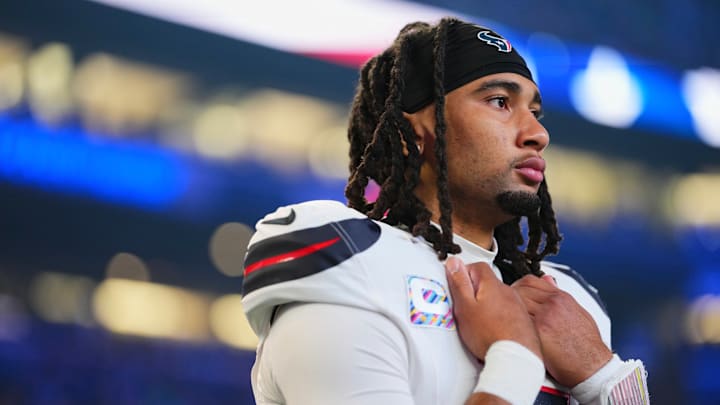Houston Texans quarterback CJ Stroud’s remained in concussion protocol on Monday after taking a violent hit from Denver Broncos cornerback Kris Abrams-Draine on Sunday. Stroud left the game in the second quarter and did not return. "He's feeling a little bit better," Texans head coach DeMeco Ryans told reporters Monday. "We’ll see how the week goes and how he progresses throughout the week."
Uh oh… CJ Stroud is down after that hit.#Texans #CJStroud #NFL pic.twitter.com/ZVKZ6h1we7
— Aggregate Sports (@AggregateSports) November 2, 2025
A flag was initially thrown on the play against Abrams-Draine, but the penalty was ultimately waved off. Replay showed Stroud made a late, awkward attempt to slide just as the defender lowered his shoulder to initiate contact.
It’s hard to assign blame in an instant like that, but it highlights a bigger issue the NFL can’t keep ignoring. Stroud’s concussion is the latest example of how vague quarterback-safety rules are putting players in danger and leaving defenders with no clear way to play within the rules.
Prayers up for Stroud.
— Richard Sherman (@RSherman_25) November 2, 2025
This is one of those very close plays where you could make a case either way. Looks like Stroud got caught in between sliding and making a move but you understand why the ref threw the flag based on the violence of the play.
pic.twitter.com/LNepWfS6Eo
CJ Stroud’s injury exposes how vague the NFL’s QB safety rules really are
Quarterbacks get an extraordinary amount of protection from the NFL rules already, but defenses have complained it's making it harder for them to do their jobs effectively. Fans can see that quarterbacks have become almost immune to the kind of contact any other player on the field would be expected to take.
Take a look at a play from the same day as Stroud's injury. In the Carolina Panthers-Green Bay Packers game, QB Bryce Young went for the sideline on a scramble play and started to let up as he was going out of bounds. Linebacker Edgerrin Cooper made contact with Young (while he was still inbounds) but didn't draw a flag because of that distinction.
Edgerrin Cooper LAYS OUT Bryce Young IN BOUNDS, no flag was thrown 🤯
— SM Highlights (@SMHighlights1) November 2, 2025
If this was Mahomes… he would be suspended. pic.twitter.com/pHF3ngOTDm
There isn’t an NFL fan alive who hasn’t seen their team get burned by a play like this. Whether they feel a penalty should've been called to protect their QB or frustrated that a clean, legal hit was flagged simply because it looked too violent.
These plays are called differently depending on the team and QB affected. The NFL needs to lay out clearer language in its rulebook and quarterbacks need to be held accountable when their own carelessness puts them at risk.
Defenders are being punished for clean hits, and quarterbacks are paying the price
We've seen plenty of times: Quarterbacks ease up as if they’re giving themselves up, then sneak in a few extra yards knowing defenders are hesitant to risk a 15-yard penalty.
Naturally, defenders are now taking more risks to stop quarterbacks from taking advantage of their hesitation. The hit Stroud took is just the latest example of it: Poor execution on his part, paired with defensive aggressiveness resulted in an unfortunate injury.
However, there does come a point when the league should force late QB slides out of the game, not only for player safety but also to keep defensive integrity alive. Especially considering Stroud poorly executed a slide that would otherwise be instantly recognizable to a defender and official. Either get down or get out of bounds quickly, or take responsibility for the hit you're going to take as a result.
The league needs clearer language before another star goes down
So, what should new language look like to better protect QBs and allow defenders to do their jobs? It would need to be something officials can judge clearly or find a quantifiable metric by which to measure it.
Something like: "A tackler is no longer subject to an unnecessary roughness (late hit) penalty on a rushing quarterback if the ball carrier has not begun the motion of sliding or giving oneself up by the time the tackler begins their descent to hit or tackle."
Make it a reviewable penalty like targeting, and the inevitable delay in action will be worth preventing QB injuries. It would also give coaches the ability to teach it in the film room for both defenders and quarterbacks. The latter would also be able to learn how to better time slides and would hopefully be deterred from dropping late to draw the extra yardage.
Injuries are unfortunate. Nobody wants to see guys like Stroud suffer like the way he did but that's where these clearer rules and better coaching will make a difference. If they are better aware of the situation and not relying on the refs to be a deterrent from incoming defenders, the onus falls on them to be responsible for their bodies while defenses still have to abide by the original safety rules. It should be a win-win for all involved.
